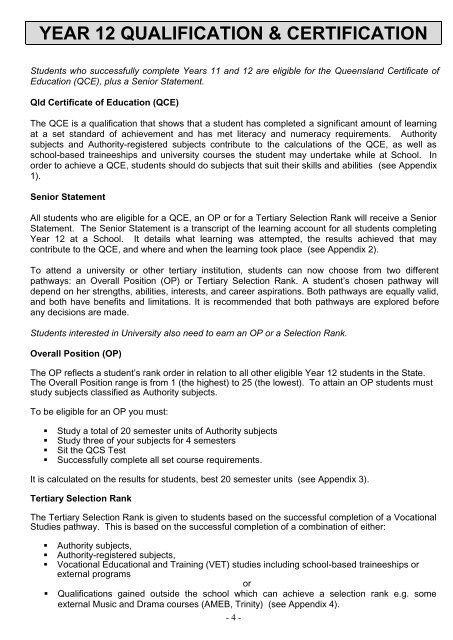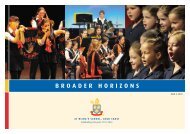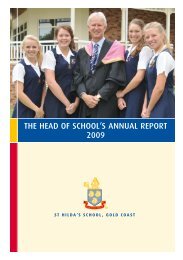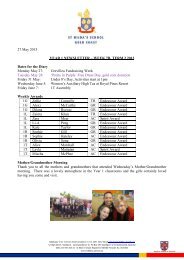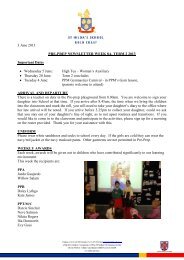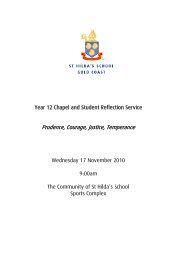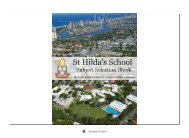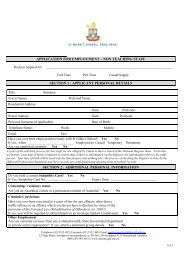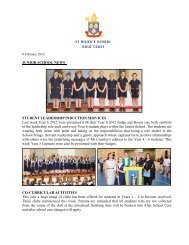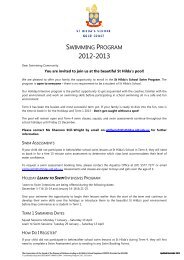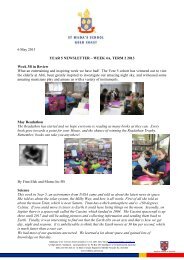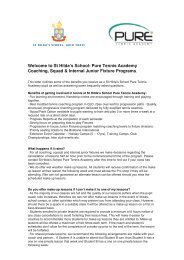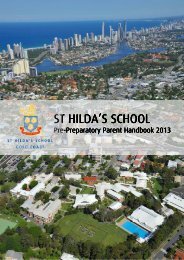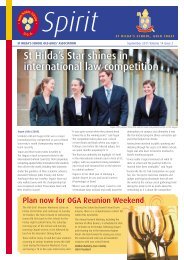subject booklet for year 11-12 - St Hildas School
subject booklet for year 11-12 - St Hildas School
subject booklet for year 11-12 - St Hildas School
Create successful ePaper yourself
Turn your PDF publications into a flip-book with our unique Google optimized e-Paper software.
YEAR <strong>12</strong> QUALIFICATION & CERTIFICATION<br />
<strong>St</strong>udents who successfully complete Years <strong>11</strong> and <strong>12</strong> are eligible <strong>for</strong> the Queensland Certificate of<br />
Education (QCE), plus a Senior <strong>St</strong>atement.<br />
Qld Certificate of Education (QCE)<br />
The QCE is a qualification that shows that a student has completed a significant amount of learning<br />
at a set standard of achievement and has met literacy and numeracy requirements. Authority<br />
<strong>subject</strong>s and Authority-registered <strong>subject</strong>s contribute to the calculations of the QCE, as well as<br />
school-based traineeships and university courses the student may undertake while at <strong>School</strong>. In<br />
order to achieve a QCE, students should do <strong>subject</strong>s that suit their skills and abilities (see Appendix<br />
1).<br />
Senior <strong>St</strong>atement<br />
All students who are eligible <strong>for</strong> a QCE, an OP or <strong>for</strong> a Tertiary Selection Rank will receive a Senior<br />
<strong>St</strong>atement. The Senior <strong>St</strong>atement is a transcript of the learning account <strong>for</strong> all students completing<br />
Year <strong>12</strong> at a <strong>School</strong>. It details what learning was attempted, the results achieved that may<br />
contribute to the QCE, and where and when the learning took place (see Appendix 2).<br />
To attend a university or other tertiary institution, students can now choose from two different<br />
pathways: an Overall Position (OP) or Tertiary Selection Rank. A student‟s chosen pathway will<br />
depend on her strengths, abilities, interests, and career aspirations. Both pathways are equally valid,<br />
and both have benefits and limitations. It is recommended that both pathways are explored be<strong>for</strong>e<br />
any decisions are made.<br />
<strong>St</strong>udents interested in University also need to earn an OP or a Selection Rank.<br />
Overall Position (OP)<br />
The OP reflects a student‟s rank order in relation to all other eligible Year <strong>12</strong> students in the <strong>St</strong>ate.<br />
The Overall Position range is from 1 (the highest) to 25 (the lowest). To attain an OP students must<br />
study <strong>subject</strong>s classified as Authority <strong>subject</strong>s.<br />
To be eligible <strong>for</strong> an OP you must:<br />
• <strong>St</strong>udy a total of 20 semester units of Authority <strong>subject</strong>s<br />
• <strong>St</strong>udy three of your <strong>subject</strong>s <strong>for</strong> 4 semesters<br />
• Sit the QCS Test<br />
• Successfully complete all set course requirements.<br />
It is calculated on the results <strong>for</strong> students, best 20 semester units (see Appendix 3).<br />
Tertiary Selection Rank<br />
The Tertiary Selection Rank is given to students based on the successful completion of a Vocational<br />
<strong>St</strong>udies pathway. This is based on the successful completion of a combination of either:<br />
• Authority <strong>subject</strong>s,<br />
• Authority-registered <strong>subject</strong>s,<br />
• Vocational Educational and Training (VET) studies including school-based traineeships or<br />
external programs<br />
or<br />
• Qualifications gained outside the school which can achieve a selection rank e.g. some<br />
external Music and Drama courses (AMEB, Trinity) (see Appendix 4).<br />
- 4 -


